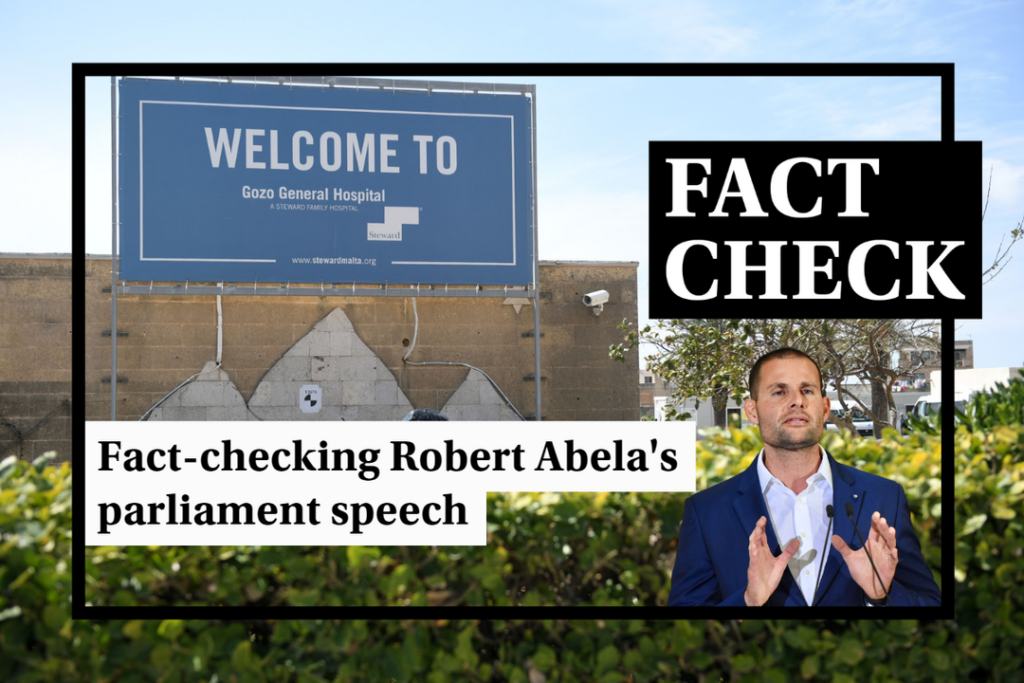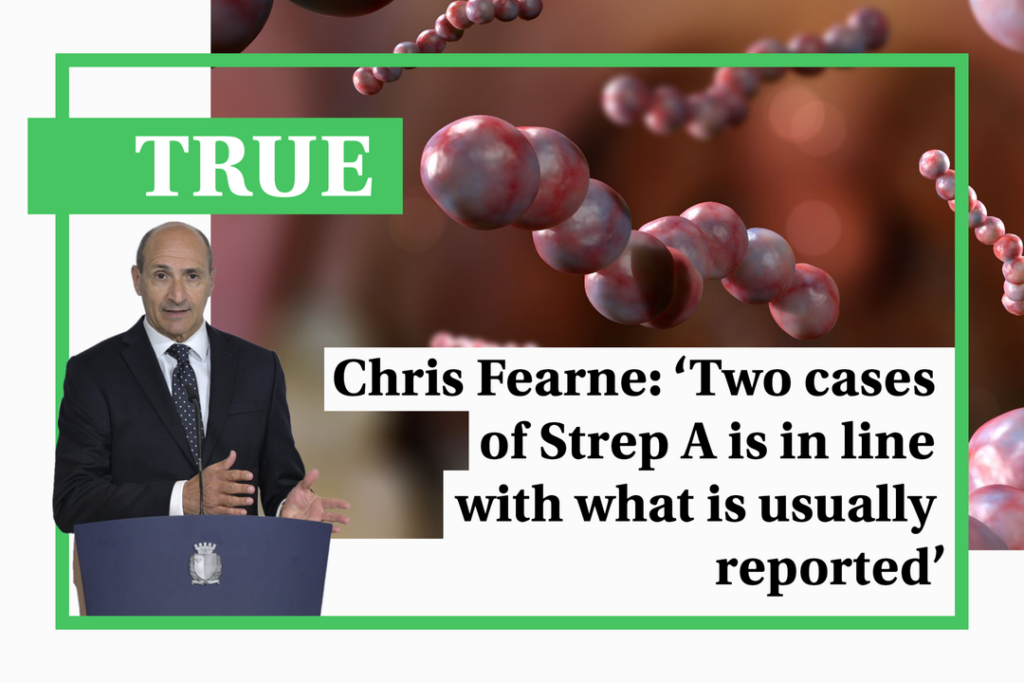In a tumultuous parliamentary session held on March 16, Prime Minister Robert Abela delivered a lengthy speech in which he defended the government’s actions in the wake of the collapse of the fraudulent hospitals deal and highlighted the work carried out by Steward Health Care over the past years.
Several readers have contacted Times of Malta to ask for some of Abela’s claims throughout the speech to be fact-checked. Some of the key statements made by Abela are assessed below.
This story refers to a recent court judgement annulling the fraudulent privatisation of three of Malta’s main hospitals. In the 2016 deal, the government granted a concession for the management of the hospitals to a newly-formed company called Vitals Global Healthcare. The hospitals were subsequently taken over by Steward Health Care Malta in 2018.
1. Claim: The courts never said that there was fraudulent behaviour on behalf of the government.
The courts repeatedly described the behaviour of Vitals and, subsequently, Steward as fraudulent, arguing that they took advantage of knowledge gleaned from a 2014 memorandum of understanding signed between the government and the investors who would later form Vitals to “deceive everyone and lead the Authorities to believe their lies and award them the project”.
Steward has hit back against the court’s judgement in their appeal, arguing that they were intentionally misled by Joseph Muscat and Keith Schembri.
However, the courts also do not absolve the government of responsibility for the deal, describing the behaviour of government officials as “unprofessional and almost amateurish”.
The courts said it is “very worrying that people responsible for government authorities could knowingly enter into such onerous obligations”, suggesting that this could be down to either “naiveté” or “pressure for the original project to remain viable”.
Although the courts describe several examples of government maladministration and poor judgement, it ultimately attributes fraudulent behaviour to Vitals and Steward, rather than the government itself.
Verdict: Mostly true.
2. Claim: Steward continued to provide patients with the service that was expected of them in Karin Grech and Gozo General Hospitals.
Abela sought to defend the service provided by Steward over the past years, saying that the two hospitals continued to treat patients and provide them with “good service” throughout the concession period. Abela went on to list the various services that the two hospitals offered between 2019 and 2022, citing the number of patients seen by several of the hospitals’ departments.
The services listed by Abela include various types of elective and non-elective surgeries, cardiology services, paediatrics and emergency services, amongst others.
Whether or not the figures cited by Abela are accurate cannot be independently verified.
Attempts to verify whether these figures tally with the data in the National Hospital Information System were unsuccessful, with Times of Malta asked to submit its request to the Ministry for Health, which was cited by Abela as the source of the figures listed in parliament.
Questions sent to Steward regarding the services provided and number of patients seen remain unanswered at the time of publication.
The investigations carried out by the Auditor General to date do not provide a detailed breakdown of the patient services offered by Vitals and Steward.
Speaking to Times of Malta the Medical Association of Malta (MAM) argued that “credit for the medical service provided should be due to the Ministry and the medical unions, not Steward since the service improved thanks to MAM’s strikes for Ministry to continue leading doctors’ service”.
MAM also expressed doubt over Abela’s claim that Gozo General Hospital received 65,000 emergency patients between 2019 and 2022, despite the island’s population only being just over 39,000 according to the latest census. This translates to each resident visiting the emergency department approximately 1.6 times over the three-year stretch.
By comparison, MAM estimate that Mater Dei hospital receives an average of 110,000 emergency patients per year, meaning that each resident in Malta would have visited its emergency department an average of 0.7 times throughout the same period.
Verdict: Unverified.
3. Claim: Steward carried out several infrastructural investments.
Abela hit back at jibes that the only infrastructural works that took place were to a telephone operator’s toilet, listing several infrastructural developments that he claims took place over the past years.
Steward list some of these investments on their own site, arguing that they have spent almost €70m in capital investment between 2015 and 2022.
Times of Malta has reached out to Steward for more detail about its capital expenditure, but no reply has been received by the time of publication.
Media reports over the past few years mention some of the investments listed by Abela, including a stroke unit, an orthotics and prosthetics unit, a new fleet of ambulances, an air ambulance helicopter, and the Barts Anatomy Centre.
Nonetheless, the damning court ruling found that a host of other promised investments were either not completed within the scheduled timeframe or never even began. These include the renovation of the Gozo hospital, the addition of a new building within the hospital, as well as extensive renovation works at St Luke’s Hospital.
The courts also pointed to the fact that Vitals never made any effort to implement its promise to introduce medical tourism to Malta, describing it as a “baseless” pledge to “blind government into awarding the contract”.
A nursing school at St Luke’s Hospital also failed to materialise, according to MCAST lecturer Ralph Cassar.
Speaking to Times of Malta, MAM confirmed the development of a new 10-bed orthopaedic unit at Karin Grech Hospital, however, described the general infrastructural investment across the three hospitals as “minimal”.
Although some infrastructural investments did take place, the court found that these fell far short of what was promised. The extent of the works or their true expense cannot be independently verified.
Verdict: Unverified.
4. Claim: The salaries of workers at Gozo General Hospital and Karin Grech Hospital amounted to €225 million until the end of 2022.
The true expense on salaries throughout the concession period of 2016 to 2022 cannot yet be independently verified, as complete financial records have not been made publicly available.
A previous Times of Malta fact-check attempted to estimate the cost of the hospitals deal, based on figures published by the Auditor General and in Steward’s financial reports, as well as in the various service agreements signed as part of the deal.
The workings used for this fact-check suggest that salary costs during this period amounted to some €218m.
Steward is arguing that the government failed to honour its commitment to supply 1,536 employees forcing Steward to “fill the gaps from its own purse” to the tune of a further €63.5m, bringing the total cost up to €281m.
It is unclear whether all this additional expense was footed by the government. However, Steward’s financial records show that on several instances they submitted reimbursement requests asking for additional labour costs to be covered by the government.
Verdict: Unverified.
5. Claim: The opposition wants workers to refund their salaries.
Abela suggested that the opposition is calling for workers’ salaries to be returned as part of the money that the government is to recoup following the collapse of the fraudulent deal, saying “I hope someone from the other side doesn’t come and say that these workers need to refund their salaries”.
PL MP Glen Bedingfield made a similar claim in a previous parliamentary sitting held on Tuesday, saying “nobody has told us if the opposition wants workers’ salaries returned”.
While the opposition has called for the money spent on the deal to be paid back, they have not explicitly asked for workers to forfeit or reimburse their salaries.
This was also clarified by PN MP Stephen Spiteri in parliament immediately following Abela’s speech, where he said “we are not arguing for the salaries that our professionals deserved not to be given”.
Given the fact that PN has never explicitly demanded workers return their pay and this was subsequently clarified by the PN shadow health minister, this claim can be interpreted as political spin.
Verdict: False.
6. Claim: Mater Dei project cost multiple times more than projected and used inferior-quality concrete. PN government awarded Skanska a waiver that exonerated it for its failings.
Towards the end of his speech, Abela attempted to turn the tables on previous PN administrations, pointing to several alleged failings in the construction of Mater Dei Hospital.
A report published in 2020 by the Auditor General found that Mater Dei was originally intended to be a 48-bed hospital at the cost of €98.1m but later evolved into an 825-bed hospital, with the total expenditure of €487.7m being “around five times” higher than the original contracted expense.
A previous investigation by the Auditor General had found that “a comprehensive investigation of the Mater Dei Hospital project was not possible, primarily due to the significant lack of documentation with respect to all stages of the project”, lamenting the “institutional failure” and “gross negligence” in the project’s management.
In 2020, the government was forced to withdraw a claim against Swedish company Skanska for the alleged use of defective concrete in the hospital’s construction following the 2009 signing of a waiver saying that the “parties will not be liable whatsoever for all and any further past, present or future concerns, claims or disputes that the parties might have”. This exonerated Skanska from any liability for the faulty concrete used at Mater Dei.
This waiver was signed as part of a “project closure” agreement in which Skanska agreed to drop €23m in claims.
Verdict: Mostly true.
7. Claim: Adrian Delia was Skanska’s legal consultant for 10 years and may have had a role in the Skanska waiver agreement.
Abela concluded his speech by arguing that Adrian Delia acted as Skanska’s legal consultant for 10 years, questioning his involvement in the 2009 waiver agreement that got the company off the hook.
In an immediate rebuttal in parliament, Delia denied this claim, saying “I had absolutely no involvement (in the waiver agreement)”.
Speaking to Times of Malta, Delia acknowledged that he provided Skanska with legal services for a number of years but once again denied any involvement in the waiver agreement that exonerated the company from any subsequent legal responsibility.
“I was entirely unaware of the waiver and only learnt of its existence through media reports,” Delia said. “I never attended any meetings with Ministry or government officials through my work with Skanska, I simply provided the company with my services as a legal consultant.”
Delia was unable to recall the length or period of his involvement with Skanska.
While it is true that Delia did provide legal services to the company, there is no evidence to suggest that Delia played any role in the development of the waiver agreement.
Verdict: Unverified.
The Times of Malta fact-checking service forms part of the Mediterranean Digital Media Observatory (MedDMO) and the European Digital Media Observatory (EDMO), an independent observatory with hubs across all 27 EU member states that is funded by the EU’s Digital Europe programme. Fact-checks are based on our code of principles.
Let us know what you would like us to fact-check, understand our ratings system or see our answers to Frequently Asked Questions about the service.


